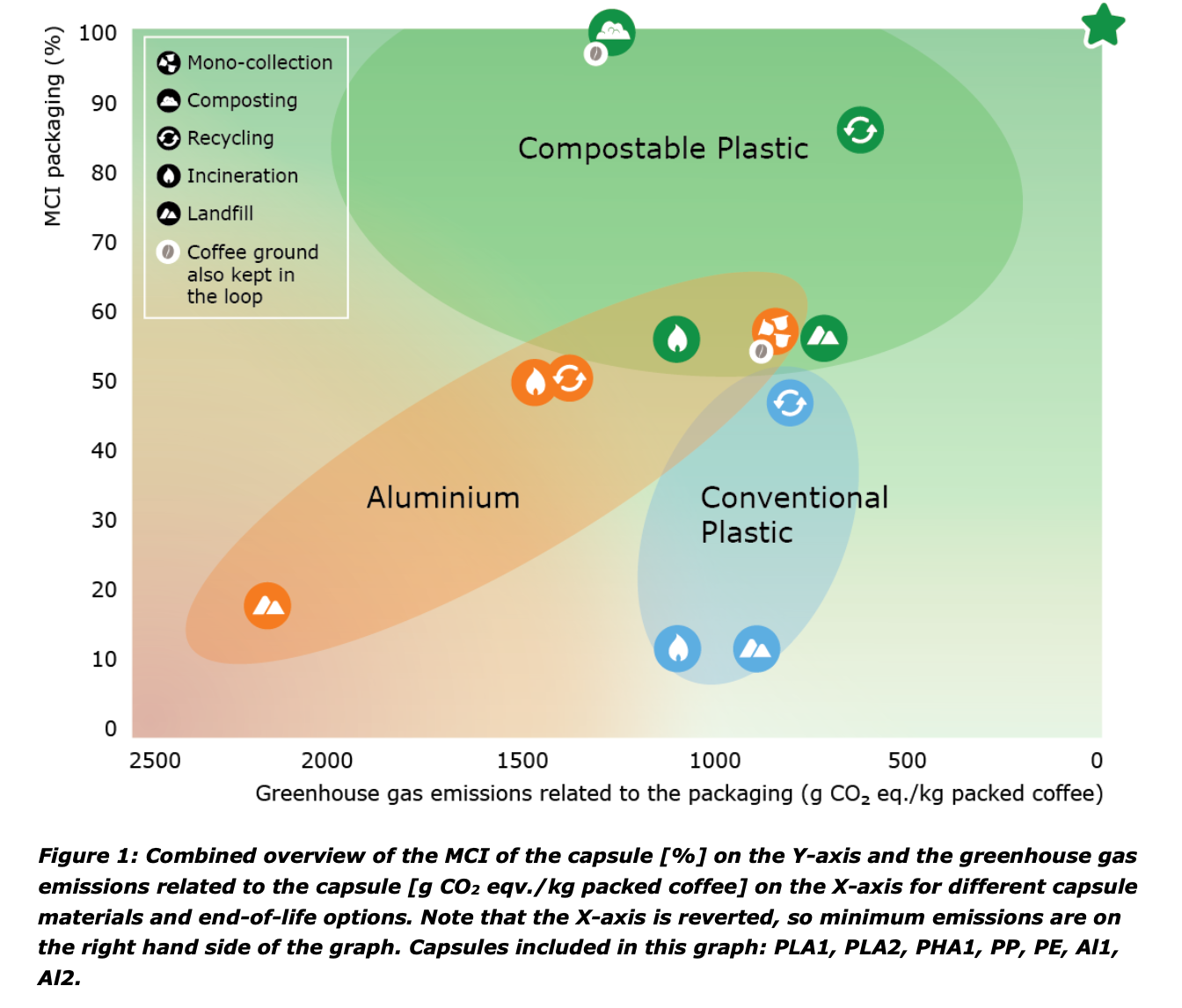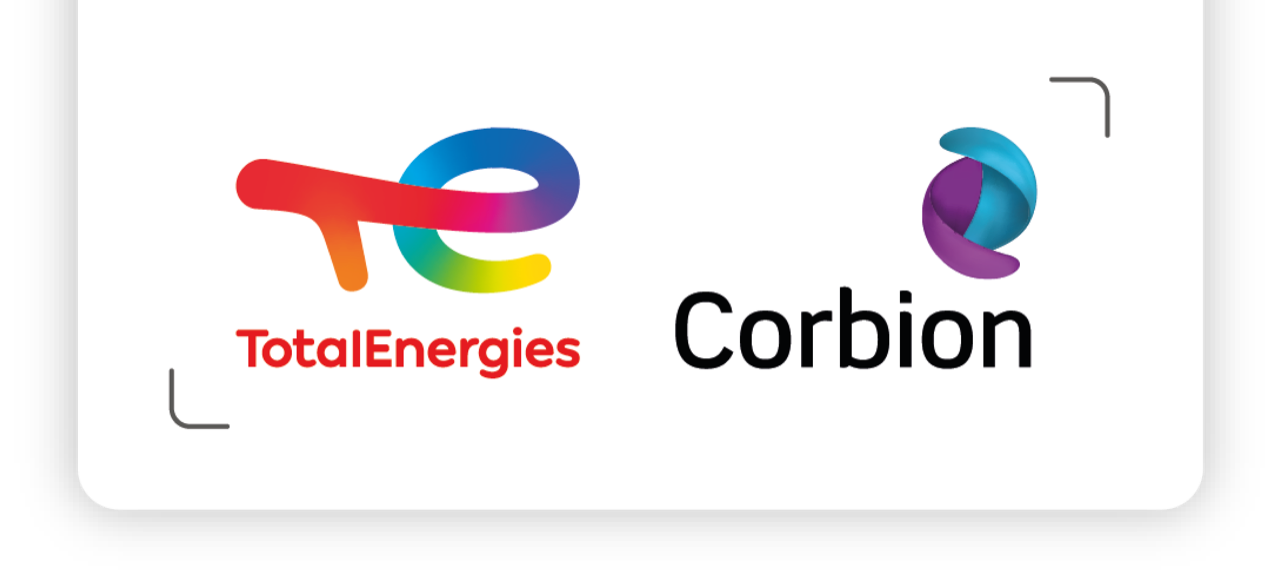
Compostable bioplastic coffee capsules outrank aluminum as most sustainable option, new study confirms
Compostable bioplastic coffee capsules outrank aluminum as most sustainable option, new study confirms
External source
GORINCHEM, Netherlands, 17th November 2023 – Wageningen University & Research recently released the 'Sustainability Assessment of Coffee Capsules' report, analyzing the environmental impact and circularity of compostable bioplastic, conventional plastic, and aluminum capsules.
The study, which assessed greenhouse gas emissions and employed the Material Circularity Indicator (MCI) developed by the Ellen MacArthur Foundation, comprehensively evaluated circularity by considering recycling rates, recycled content, process yield, biobased content, reusability, and lifespan. Additionally, it examined various end-of-life scenarios, such as industrial composting (specifically for compostable capsules), recycling through lightweight packaging waste collection, incineration with energy recovery, landfill with energy recovery, and mono-collection (specifically for aluminum capsules).
The reports concludes that when considering both greenhouse gas emissions and circularity, compostable plastic capsules are the most sustainable option, namely those made of PLA and PHA. Their MCI is 100% (fully circular) when the capsules are composted: materials are both biobased (non-fossil based) and biodegradable. Both coffee grounds and capsule material can be kept in the loop as they are “organically recycled” via the biosphere into compost. Compostable options remain sustainable even when consumers dispose of the capsules in the ‘wrong’ container. Currently in the Netherlands, the main hurdle is getting compostable coffee capsules accepted in the separately collected municipal organic waste.
To tackle the composting challenge, the report recommends: “Compostable coffee capsules are a promising solution in terms of sustainability but require multi-stakeholder consensus. We therefore recommend that the national government initiates negotiations between the coffee industry, the waste management industry and material producers to define the conditions at which the compostable capsules can be accepted to be treated with separately collected municipal organic waste. Alternatively, in the context of the ongoing discussion regarding the Packaging and Packaging Waste Regulation, EU institutions should confirm the initial proposal of the European Commission and demand the use of compostable materials for coffee capsules and pods and their processing with organic waste.”
“At TotalEnergies Corbion we are looking forward to the implementation of European legislation that ensures that the most sustainable end of life option for PLA products is possible across Europe, and not only in a few countries, like Italy for example” said Thomas Philipon, CEO TotalEnergies Corbion.
Aluminum capsules rank as the second-best option only when collected separately through dedicated systems (mono-collection), enabling aluminum recycling and coffee composting. However, despite using recycled aluminum for capsule production, the Material Circularity Indicator (MCI) remains lower (around 60%) compared to compostable capsules. A closed recycling loop isn't viable due to the accumulation of untargeted trace elements in aluminum, diminishing its flexibility over time. Additionally, a significant challenge lies in achieving widespread participation in a voluntary mono-collection system.
As for conventional fossil-based plastics, the research shows that they do not fit in a circular economy as neither the plastic capsules nor the spent coffee grounds are recycled. The MCI is below 50%.
“Annually, billions of coffee capsules are used in Europe. Even though coffee grounds contribute the most to greenhouse gas emissions when it comes to single serve coffee use, the material used in these capsules has a sizable impact nonetheless,” project lead Ingeborg Smeding explained.
For more information please refer to the study: https://www.wur.nl/en/research-results/research-institutes/food-biobased-research/show-fbr/compostable-capsules-most-sustainable-option-for-single-serve-coffee-units.htm

END PRESS RELEASE
For more information please contact:
Rui Veras
Marketing Communications Manager
M +31 629 055 522
E rui.veras@totalenergies-corbion.com
Frank Duijzer
Business Development Manager
M +31 6 8992 1574
E frank.duijzer@totalenergies-corbion.com
About TotalEnergies Corbion
TotalEnergies Corbion is a global technology leader in Poly Lactic Acid (PLA) and lactide monomers. PLA is a biobased and biodegradable polymer made from annually renewable resources, offering a reduced carbon footprint versus traditional plastics. The Luminy® PLA portfolio, which includes both high heat and standard PLA grades, is an innovative material that is used in a wide range of markets from packaging to consumer goods, fibers and automotive. TotalEnergies Corbion, headquartered in the Netherlands, operates a 75,000 tons per year PLA production facility in Rayong. The company is a 50/50 joint venture between TotalEnergies and Corbion. www.totalenergies-corbion.com
About TotalEnergies
TotalEnergies is a global multi-energy company that produces and markets energies on a global scale: oil and biofuels, natural gas and green gases, renewables, and electricity. Our 105,000 employees are committed to energy that is ever more affordable, cleaner, more reliable, and accessible to as many people as possible. Active in more than 130 countries, TotalEnergies puts sustainable development in all its dimensions at the heart of its projects and operations to contribute to the well-being of people. www.totalenergies.com
About Corbion
Corbion is a sustainable ingredients company dedicated to preserving what matters, including food and food production, health, and the planet. We specialize in lactic acid, lactic acid derivatives, food preservation solutions, functional blends, and algae ingredients, using our deep application and product knowledge to propel nature’s ingenuity through science. With more than a century of experience, we continue working side-by-side with our customers to make our cutting-edge technologies work for them. Leveraging our advanced capabilities in fermentation and preservation technology, we help customers differentiate their products in diverse markets ranging from food and animal nutrition to home & personal care, pharmaceuticals, electronics, medical devices, and bioplastics. In 2022, Corbion generated annual sales of €1,457.9 million with a workforce of 2,601 FTEs. Corbion is listed on Euronext Amsterdam. For more information: www.corbion.com




